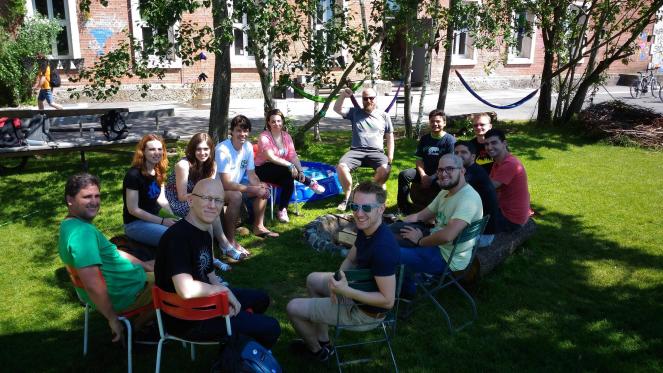Students from Indonesia, openSUSE participates in GSoC!
openSUSE participates again in Google Summer of Code (GSoC), a program that awards stipends to university students who contribute to real-world open source projects during three months in summer. ![]() With this article, I will provide my experience as a former GSoC student and mentor, give you more details about the program and try to encourage Indonesian students to get involved in openSUSE development through GSoC.
With this article, I will provide my experience as a former GSoC student and mentor, give you more details about the program and try to encourage Indonesian students to get involved in openSUSE development through GSoC.
Why open source and openSUSE?
First of all, you may wonder why you should want to get involved in open source development. Everybody has their own reasons, but for me there are three main ones:
- I have fun: The most important reason is that it is fun. At openSUSE, we have great conferences, geekos everywhere, geeko cookies,… and the most important part: we have fun when working!
- I learn a lot: In most of the projects, every single line of code is reviewed. That means not only that the code quality is better, but also that every time you write something wrong or that can be improved, someone will tell you. In open source, we think that making mistakes is perfectly fine. That people correct you is the best way to learn.
- People: I have the chance to work with really skilled people all around the world, who are interested in the same things as me.


Why GSoC?
Starting is always difficult, but you don’t have to do it alone! In openSUSE, you will always find people to help you, and with GSoC this is even easier. The best feature of the program is that you will always have at least one mentor (most likely two) who will lead you through it. In addition, you will work in a project used in real word by many users and all your code will be released under an open source license, so everybody can access, use, change and share it. Last, you will receive a stipend, 2400 dollars in Indonesia.
Projects
At openSUSE, you can find projects written in Ruby on Rails, Perl, Ruby, HTML/JavaScript, C/C++ and much more. This year you can work during GSoC in some of the most central and biggest projects in openSUSE: OpenBuildService, openQA and YaST. They will for sure be challenging projects to work in, but don’t get scared, as that means that you will learn a lot from it too. And remember that your mentors and other openSUSE contributors will be there to help you!
But we also have simpler projects such as Trollolo, where any computer science university student could get started with Ruby. The desire to learn is much more important than the previous experience and knowledge.
You can find all the projects and more information in our mentoring page: http://101.opensuse.org. And if the projects at openSUSE doesn’t match your expectations, you can check other organizations: https://summerofcode.withgoogle.com/organizations. You should look for a project that you consider interesting and that will allow you to learn as much as possible.
Let’s do it!
When I travelled to openSUSE Asia in October, I had the chance to speak with some members of the Indonesian community and I found out that we have a huge community of openSUSE users in Indonesia. And a big part of this community are university students of Computer Science. However, those students don’t get involved in the development of openSUSE. I also heard many times during the conference that students in Indonesia and in Asia in general are shy and that they find the open source development scary. I hope that with this blog post I can achieve that Indonesian students lose their fear and encourage them to get involved in openSUSE development.
The GSoC application period starts on March 12th, but you can already take a look at the organizations and projects and find the best one for you. Approaching the people in the project is also important, as you will be working with them for three months. We recommend to make at least one contribution to the project you want to apply for as that will help you to find out if this is the right project for you and to write a good proposal, but you do not need to send a lot of pull requests.
And if you have doubts do not hesitate to contact us. You can tweet us at @opensusementors, write in our mailing list (opensuse-project@opensuse.org) or directly contact the mentors. We are looking forward to hear from you, so don’t be shy! ![]()

About me
My name is Ana María Martínez and I started with openSUSE as a GSoC student. Since then I keep contributing in open source projects inside and outside openSUSE. I am currently working at SUSE in the Open Build Service Frontend Team and I am a mentor for openSUSE at GSoC. You can find me in Github(@Ana06) and contact me by email, Twitter (@anamma_06), IRC (@Ana06) and by writting a comment in this blog post. ![]()
This blog post was translated to Indonesian and published in opensuse.id.
I wrote a similar blog post which was published in news.opensuse.org. This version was also translated to Japanese and published in blog.geeko.jp and to Spanish and published in victorhckinthefreeworld.com.

 Except where otherwise noted, this blog's content is licensed under a
Creative Commons Attribution 4.0 International License.
Except where otherwise noted, this blog's content is licensed under a
Creative Commons Attribution 4.0 International License.